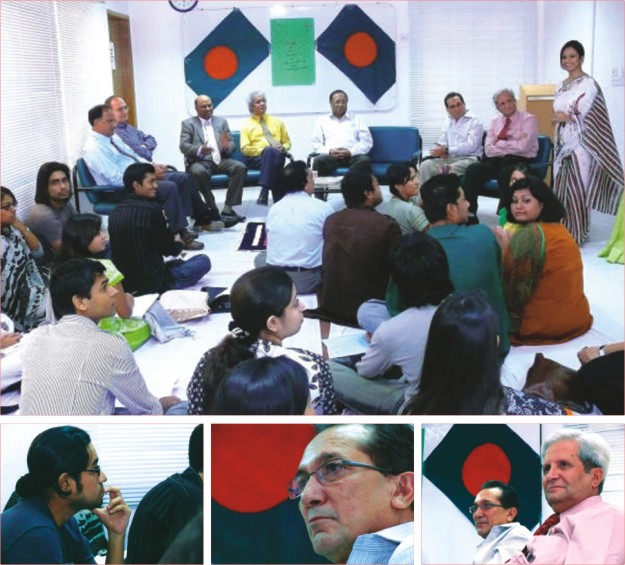Feature

HELP Our People Empathize (HOPE), a voluntary social service group, comprising of students, alumni and faculty members of the Independent University, Bangladesh, organised an hour-long discussion session, as part of a series, on the War of Liberation at the university campus on October 30, 2008, (last Thursday). Munsia N Ahmed, Senior Lecturer, Department of Media and Communication (IUB), and also the Founder and Chairperson of HOPE, opened the event with a brief introduction about the organization and its recent activities.
Then the floor went to the invited panel of guests, which included Maj. (Retd.) A Matin Chowdhury, currently a member of the Board of Trustees of IUB, General (Retd.) Syeed Ahmed, Lt. Col. (Retd.) Mohammad Nazul Islam, BP, PSC, and Mr. Akku Chowdhury, who is also member of the Board of Trustees of the Liberation War Museum. Also presiding over the event was Prof. Bazlul Mobin Choudhury, Vice Chancellor, IUB; Dr. Tanvir Ahmed, Registrar, Prof. Nazrul Islam, Director of School of Liberal Arts and Social Sciences (SLASS), and Dr. GM Shahidul Alam, Head of Department of Media and Communications.
In order to structure the discussion in a manner suitable to the young audience, which comprised of students of various department of the university, General Syeed first asked the attendees what questions they had about the events to, during, and since 1971. The responses mainly focused around the reasons behind the War, and the socio-political situation in Bangladesh since the War, and particularly the cloudy issue of patriotism in contemporary Bangladesh.
Professor B M Choudhury and Dr Shahidul Alam tackled one area by explaining the different social, political, and cultural factors that led to the conflict.
The invited panel, comprising of the four freedom fighters, three of whom were part of the 1st Bangladesh War Course, which was commissioned during the War, took over from there, and went on to explain the overwhelming situation of prejudice and discrimination, which was present in all sections of the society, as well as share a few of their personal experiences.

Maj. Matin also explained a bit on the financial and business situation in the East Pakistan during the pre-War period.
Each of them stated their reasons for joining the War, at which point arose questions about patriotism and the role of language and where we stand. At this point, Col. Nazrul Islam took over and waxed eloquent on the subject of culture and upbringing in the role of developing patriotism in Bangladesh.
The fervent atmosphere of the event encouraged the guests to answer as many of the eager questions as possible, many of which included queries as to why the war took place in the first place, what the situation of East Pakistan during that period was like, the issue was of hate that still exists, the concept of “Muktijuddher Chetona”, and even one student's uncertainty, “whether it makes me unpatriotic if I support the Pakistan team during cricket?”. Akku Choudhury articulately wrapped up the session with a very simple, yet moving explanation on the spirit of patriotism- “Muktijuddher Chetona, very simply put, is ones' love for one's country, and this can be expressed in one's own way.”
The discussion then ended on a positive note, and was followed by refreshments and photographs. The invited guests expressed their appreciation to the organiser for holding such a discussion and were encouraged by the enthusiasm shown by the young participants. HOPE has further plans for their patriotism project, so stay tuned for more news coming soon.
(Student of Media and Communication Independent University, Bangladesh)
|
